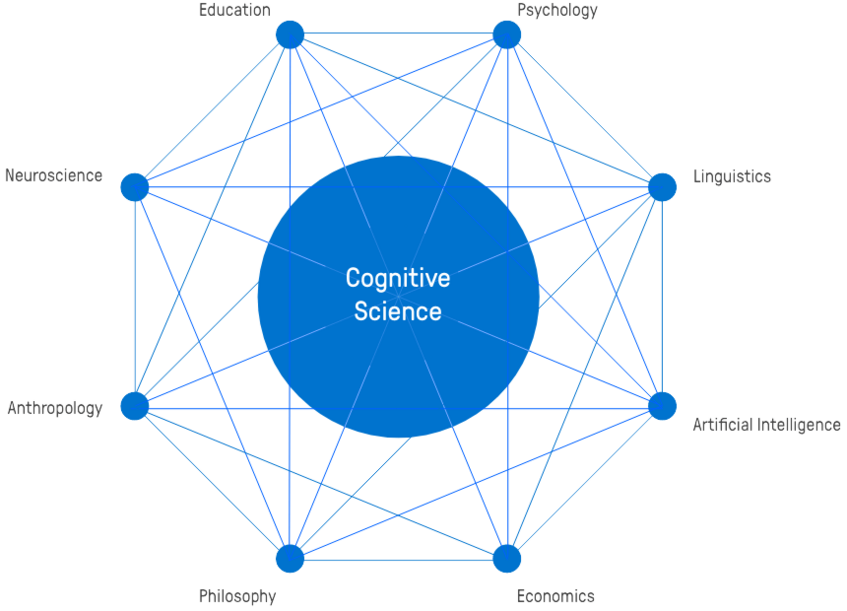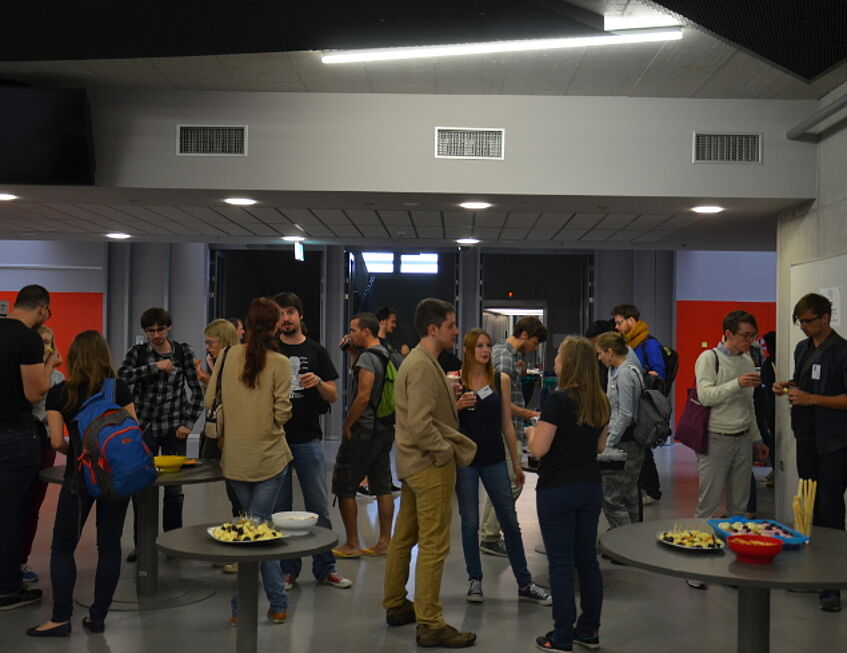About MEi:CogSci Vienna
MEi:CogSci (Middle European interdisciplinary master’s programme in Cognitive Science) is a research-based joint master’s programme with a strong focus on project and team work. Offering a plurality of different learning settings, MEi:CogSci aims to engage students in interdisciplinary discourse and different (scientific) cultures.
Cognitive Science
The MEi:CogSci programme in Vienna provides students from different academic backgrounds the opportunity to acquire and expand their knowledge and understanding of fundamental concepts and methods in the core disciplines of Cognitive Science (including Anthropology, Artificial Intelligence, Biology, Linguistics, Neuroscience, Philosophy, Psychology). On the one hand, the programme offers training in basic and advanced disciplinary and methodological courses. On the other, MEi:CogSci allows students to investigate a cognitive phenomenon of their interest from different perspectives, thereby gaining expertise in theories and methods from multiple disciplines. In general, MEi:CogSci Vienna is marked by a vibrant learning and research environment with collaborations across universities and institutions in and around Vienna.


Interdisciplinarity
Interdisciplinarity, collaboration and reflection lie at the heart of the programme. Especially the MEi:CogSci’s interdisciplinary approach challenges students to look at taught concepts and phenomena from different perspectives. Students are encouraged to bring in their own background and to engage critically with theories and materials used in class. The programme’s early focus on collaboration in an interdisciplinary and intercultural learning environment enables students to engage in interdisciplinary discourse and research. With English as the primary language of instruction, the programme aims to be inclusive to students from across the globe. From the start, students work and study in interdisciplinary and intercultural student teams, work that continues in interdisciplinary research teams in later semesters. The programme combines traditional teaching formats with alternative formats such as problem-based learning. Courses in research methods in Cognitive Science complement the programme’s training.
Qualifications and Job Possibilities
MEi:CogSci graduates are well-equipped to pursue an academic career (PhD programme) in Cognitive Science and related disciplines. Apart from basic research, previous graduates increasingly work in applied research and the private sector. Depending on the direction of specialisation, prospective career fields include the IT-sector, education, biomedical and clinical research, as well as economics. Overall, the MEi:CogSci programme fosters general skills such as teamwork, communication, reflection and evaluation skills, quick learning ability and adaptability. Taken together, this qualifies MEi:CogSci graduates for work in a wide variety of areas and at various intersections between disciplines and professional fields. This includes the IT and education sectors, as well as consulting, human resources development and science journalism among a host of others.

Collaborations
The MEi:CogSci programme is based at the Faculty of Philosophy and Education, Department of Philosophy. To allow for a broad interdisciplinary perspective (including disciplinary perspectives which are not part of mainstream cognitive science research), the programm draws on courses and resources from different faculties, universities and non-university research institutions.
In this spirit, MEi:CogSci Vienna maintains collaborations with:
- Department of Philosophy, University of Vienna
- Vienna Cognitive Science Hub, University of Vienna
- Social, Cognitive and Affective Neuroscience Unit (SCAN-Unit), University of Vienna
- MR Centre of Excellence, fMRI Lab, Medical University of Vienna
- Center for Brain Research, Medical University of Vienna
- Center for Medical Data Science, Medical University of Vienna
- Computational Imaging Research Lab, Medical University of Vienna
- Institute of Artificial Intelligence, Medical University of Vienna
- Austrian Research Institute for Artificial Intelligence (OFAI)
- Sustainable Computing Lab
- Austrian Institute of Technology
- Automation and Control Institute (ACIN), Vienna University of Technology
- Institute for Data, Process and Knowledge Management, Vienna University of Economics and Business
- Knowledge Management Group, Vienna University of Economics and Business
- Research Studios Austria FG
- Konrad Lorenz Institute for Evolution and Cognition Research (KLI)
- Messerli Research Institute, University of Veterinary Medicine, Vienna
- NGO Committee On Ageing & International Federation on Ageing (IFA)
- Department for Knowledge and Communication Management, University for Continuing Education, Krems
- Neuropsychopharmacology and Biopsychology Unit (NBU), University of Vienna
- Laboratory for Cognitive Research in Art History (CReA Lab), University of Vienna
- Department of Behavioral & Cognitive Biology, University of Vienna
- Department of Cognition, Emotion, and Methods in Psychology, University of Vienna
- Department of Cognitive Science, Central European University
- Department of Developmental and Educational Psychology, University of Vienna
- Department of English and American Studies, University of Vienna
- Department of German Studies, University of Vienna
- Department of Linguistics, University of Vienna
- Division for Language Learning and Teaching Reserach (FDZ), University of Vienna
- Centre for Translation Studies, University of Vienna
- EVA Lab - Empirical Visual Aesthetics, University of Vienna
- Research Group Neuroinformatics, Faculty of Computer Science, University of Vienna
- Research Group Visualization and Data Analysis (VDA), University of Vienna
- Complexity Science Hub (CSH)
